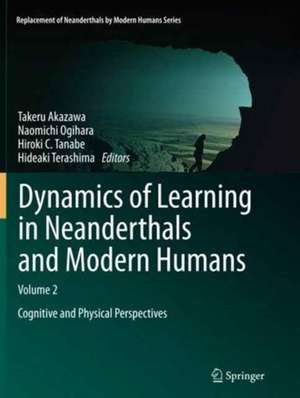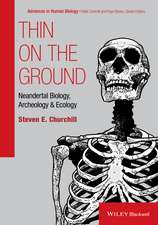Dynamics of Learning in Neanderthals and Modern Humans Volume 2: Cognitive and Physical Perspectives: Replacement of Neanderthals by Modern Humans Series
Editat de Takeru Akazawa, Naomichi Ogihara, Hiroki C Tanabe, Hideaki Terashimaen Limba Engleză Paperback – 27 aug 2016
| Toate formatele și edițiile | Preț | Express |
|---|---|---|
| Paperback (1) | 569.60 lei 38-44 zile | |
| Springer – 27 aug 2016 | 569.60 lei 38-44 zile | |
| Hardback (1) | 599.36 lei 38-44 zile | |
| Springer – 11 feb 2014 | 599.36 lei 38-44 zile |
Preț: 569.60 lei
Preț vechi: 712.01 lei
-20% Nou
Puncte Express: 854
Preț estimativ în valută:
109.00€ • 113.11$ • 91.11£
109.00€ • 113.11$ • 91.11£
Carte tipărită la comandă
Livrare economică 12-18 martie
Preluare comenzi: 021 569.72.76
Specificații
ISBN-13: 9784431561736
ISBN-10: 4431561730
Pagini: 243
Ilustrații: XIII, 243 p. 161 illus., 75 illus. in color.
Dimensiuni: 210 x 279 x 12 mm
Ediția:Softcover reprint of the original 1st ed. 2014
Editura: Springer
Colecția Springer
Seria Replacement of Neanderthals by Modern Humans Series
Locul publicării:Tokyo, Japan
ISBN-10: 4431561730
Pagini: 243
Ilustrații: XIII, 243 p. 161 illus., 75 illus. in color.
Dimensiuni: 210 x 279 x 12 mm
Ediția:Softcover reprint of the original 1st ed. 2014
Editura: Springer
Colecția Springer
Seria Replacement of Neanderthals by Modern Humans Series
Locul publicării:Tokyo, Japan
Cuprins
Introduction.- The Cognition of Homo neanderthalensis and H. Sapiens: Does the Use of Pigment Necessarily Imply Symbolic Thought?.- Comparisons between Individual, Imitative and Instructed Learning.- The Ability to Objectify Conventional Styles of Problem-Solving: A Hypothesis on the Difference in Learning Ability between Modern Humans and Neanderthals.- Cognitive Flexibility and Object-making in Baka Pygmy Children.- The Demonstration of Resilience in the Drawings of Baka Pygmy Children.- Social Learning, Trial-and-Error, and Creativity.- Experimental Studies of Modern Human Social and Individual Learning in an Archaeological Context: People Behave Adaptively, But within Limits.- Motion Analysis for Stone-Knapping of the Skilled Levallois Technique.- Daily Physical Activity and Time-Space Using of Pygmy Hunter-Gatherers' Children in Southeast Cameroon.- Estimation of the Period of Childhood and Child Growth Characteristics of Pygmy Hunter-Gatherers in Southeast Cameroon.- Interpretations of Practical Population Genetics Analyses of Genome-Wide SNP Data on Human Demography.- Functional Craniology, Human Evolution, and Anatomical Constraints in the Neanderthal Braincase.- Cerebral Sulci and Gyri Observed on Macaque Endocasts.- The Coronal Suture as an Indicator of the Caudal Border of the Monkey Prefrontal Cortex.- Application of Sliding Landmark Method for Morphological Analysis of Modern Japanese Neurocranial Shape.- A Geometric Morphometric Study of Neurocranial Shape Variations in the Crania of Modern Japanese.- Statistical Interpolation of Missing Parts in Human Crania Using Regularized Multivariate Linear Regression Analysis.- Transferring Semi-Landmarks by Minimizing Bending Energy on Surfaces.- CT Image Segmentation for Bone Structures Using Image-Based FEM.- Virtual Endocast of Qafzeh 9: A Preliminary Assessment of Right-Left Asymmetry.- Reconstruction of the Brain from Skull Fossils Using Computational Anatomy.- Integrated Analytical Scheme for Comparing Neanderthal’s Brain to Modern Human Brain Using Neuroimaging Techniques.- Cerebellar Size Estimation from Endocranial Measurements: An Evaluation Based on MRI Data.- Sense of Acceptance: Key Factor of Social Learning.- Brain Activation Related to the Imitative Learning of Bodily Actions Observed during the Construction of a Mousterian Stone Tool: A Functional Magnetic Resonance Imaging Study.- Neural Substrates Associated with Motivation to Learn in Modern Humans.
Textul de pe ultima copertă
This volume is the second of two volumes of proceedings from the International Conference on the Replacement of Neanderthals by Modern Humans, which took place in Tokyo in November 2012. This second volume reports, in four major sections, findings by cultural anthropologists, physical anthropologists, engineering scientists and neurophysiologists, integrated in multidisciplinary fashion to solidify the overall understanding of the mechanics of replacement from cognitive and physical perspectives. Part 1 provides examinations of replacement related questions from various perspectives in cognition and psychology. Part 2, consisting of studies rooted in body science and genetics, provides detailed findings which fill in the broader frame of the replacement phenomenon. Part 3 presents a collection of papers whose findings about fossil crania and brain morphology shed direct light on immediate questions regarding replacement. Part 4 provides illuminations similar to those in part 3, but arising from the analytical empowerment afforded by neuroscience. The collection of 26 papers in this volume makes available to readers both broad and narrow insights on the mechanisms of the replacement/assimilation of Neanderthals by modern humans and at the same time provides a model of new-paradigm multidisciplinary collaboration on a complex problem.
Caracteristici
Proposing and validating the novel hypothesis that the replacement of Neanderthals by modern humans took place because of differences in learning ability Providing up-to-date information on the research of Neanderthals and Modern Humans Promoting and facilitating an interdisciplinary research framework and lasting cooperation across the disciplines
























